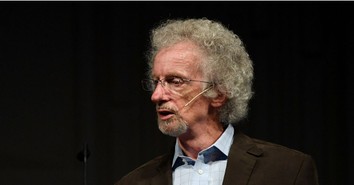Are Human Rights a Fantasy?
In a TEDX talk years ago, Israeli historian Yuval Noah Harari made the startling claim that human rights do not exist.
[H]uman rights are just like heaven and like God: It’s just a fictional story that we’ve invented and spread around. …It is not a biological reality, just as jellyfish and woodpeckers and ostriches have no rights, Homo sapiens have no rights. …Take a human, cut him open, look inside—you find their blood, and you find the heart and lungs and kidneys, but you don’t find there any rights. The only place you find rights is in the fictional stories that humans have invented and spread around.
Last week, Harari’s talk resurfaced on the site formerly known as Twitter and sparked a lively debate among Tom Holland, author of Dominion; Glen Scrivener, an Anglican priest and author of The Air We Breathe; and Jordan Peterson, the Canadian psychologist who wrote 12 Rules for Life. Scrivener took issue with Harari’s materialism and called his remarks about human rights “nonsense.” Rights are indeed faith-based, he said, but that doesn’t make them any less real.
Tom Holland, who is not a Christian, responded that while he believes in human rights, they are not self-evident. Rather, they require an act of subjective belief. “Human rights have no more objective reality than, say, the Trinity,” wrote Holland. “Both derive from the workings of Christian theology; and both, if they are to be believed in, require people to make a leap of faith.”
Jordan Peterson disagreed, and responded in somewhat jumbled psychological lingo that rights are somehow “built into the structure of human being[s]” and are therefore “[n]ot arbitrary at all.” Holland shot back that if rights really are somehow “built into” reality, it’s awfully strange that the concept of human rights only emerged around the twelfth century in a specifically Christian and Western political context.
The whole exchange was fascinating and instructive. For example, if the idea that human rights are not universal seems strange, that just shows how deeply Western you are. For most of history, as Holland described in his book Dominion, the idea that humans have “self-evident” rights to “life, liberty, and the pursuit of happiness” would have been baffling. “A Roman would have laughed at it.”
Yet today, “rights” language is central to our way of life. It was at the heart of the United Nations’ 1948 Universal Declaration of Human Rights, which asserted, following the Holocaust, that “inherent dignity” and “equal and inalienable rights of all members of the human family” are “the foundation of freedom, justice and peace in the world.” Obviously, the UN declaration was inspired by the Declaration of Independence, which also called rights self-evident but went further to name their source: a Creator who endowed people with “certain inalienable Rights.”
If true, then human rights are indeed universal. However, that doesn’t mean these rights will be universally recognized. For example, what of those civilizations that do not acknowledge a Creator, or even, that Creator? And what of the increasingly secular, post-Christian West? Can the idea of human rights be long sustained, much less enforced globally if God is no longer acknowledged? If there is no one to endow human rights, how can everyone be expected to honor them? There remains widespread agreement that genocide, terrorism, and slavery are wrong, but by what authority will we continue to agree?
Glenn Scrivener offered the best answer to these questions. “Rights indeed belong to all,” he says, “—that’s the nature of them. But they’ve also come from somewhere particular.” The source is not just any God, but the God Who specifically became man in Jesus Christ, forever ennobling human nature and sparking the Christian revolution that would shape the West and inspire this declaration, that all are “created equal.”
It’s vital to note that Jesus did not invent the sanctity of life, the love of neighbor, or the inherent value of each individual human during His earthly ministry. Rather, through His life, obedience, death, and resurrection, He restored this concept that is inherent in creation, established by God’s own words, “Let us make man in our image, after our likeness.”
At the heart of Christianity is the claim that our Savior is also our Creator. The idea that humans have inherent, eternal value is a truth Christianity gives back to a fallen world. This claim and the rights inferred from it are real and universal precisely because the God who first made the world and us is.
As the West loses touch with this God, it will also lose grasp on the concept of human rights. Scrivener warned, a dark “pit” awaits those who adopt Harari’s view of morality. In the days to come, only Christians, who first gave the West its concept of rights, will be able to declare them with any authority. That, at least, should be self-evident by now.
This Breakpoint was co-authored by Shane Morris. For more resources to live like a Christian in this cultural moment, go to breakpoint.org.
Image credit: ©Jacek Dylag/Unsplash
John Stonestreet is President of the Colson Center for Christian Worldview, and radio host of BreakPoint, a daily national radio program providing thought-provoking commentaries on current events and life issues from a biblical worldview. John holds degrees from Trinity Evangelical Divinity School (IL) and Bryan College (TN), and is the co-author of Making Sense of Your World: A Biblical Worldview.
The views expressed in this commentary do not necessarily reflect those of CrosswalkHeadlines.
BreakPoint is a program of the Colson Center for Christian Worldview. BreakPoint commentaries offer incisive content people can't find anywhere else; content that cuts through the fog of relativism and the news cycle with truth and compassion. Founded by Chuck Colson (1931 – 2012) in 1991 as a daily radio broadcast, BreakPoint provides a Christian perspective on today's news and trends. Today, you can get it in written and a variety of audio formats: on the web, the radio, or your favorite podcast app on the go.








